Most popular articles for January 2024:
One day, while looking for some fresh reading material, I Googled the phrase best post-apocalyptic science fiction books of all time. The results were disappointing. I found plenty of lists and articles proclaiming the “best post-apocalyptic books.” But most of them lacked the sci-fi angle I was looking for.
So I said to myself: “Self, this here is a void that needs to be filled. And you’re just the guy to fill it.” I then curated my own list, compiling some of the best books that feature both post-apocalyptic and science fiction elements.
Post-Apocalyptic Sci-Fi Books Worth a Look
All of the novels below have one thing in common. Something comes along to wipe out the “world as we know it,” forcing humanity to struggle against seemingly impossible odds. But aside from that, these nine books are all very different. They offer readers a wide variety of civilization-ending threats and scenarios, ranging from predatory plants to artificial intelligence.
1. The Day of the Triffids, by John Wyndham
We’re going all the way back to 1951 for this first post-apocalyptic science fiction novel. The Day of the Triffids has its flaws and might seem a bit “dated” when you read it. It is more than 70 years old, after all. But it helped usher in the post-apocalyptic genre and offers a highly original premise.
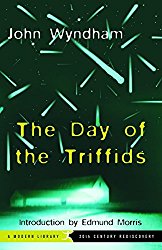
How’s this for a setup? After most people around the world are blinded by an apparent meteor shower, an aggressive species of plant starts picking them off.
In this book, John Wyndham envisions a kind of biological warfare that didn’t exist in his time but would arise many years later. That’s the sci-fi component. Well, that plus the sentient, predatory, seven-foot-tall plants that use their roots like feet to walk around and dispatch humans.
Here’s the bottom line: If you’re looking for the best contemporary post-apocalyptic sci-fi books, this ain’t it. But if you’re interested in the origins of this genre, and the early writers who paved the way for today’s post-apocalyptic science fiction, do yourself a favor and put The Day of the Triffids onto your reading list.
pick up below…
2. The Girl With All the Gifts, by M.R. Carey
With his 2015 novel The Girl With All the Gifts, author M.R. Carey delivers a masterclass in how to write an original and compelling post-apocalyptic science fiction novel.
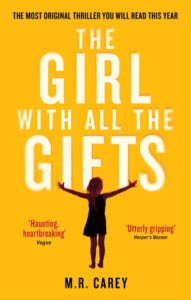
This book takes place after the fall of civilization and tells the story of Melanie, a girl who walks between two worlds. Melanie is good at heart — but also dangerous. She is human and “other” all at once. And as the title suggests, she has certain gifts that make her all the more special.
With this post-apocalyptic tale, M.R. Carey takes the “outbreak genre” in a new and exciting direction. I don’t want to say too much about it, since the author has purposely created an air of mystery. The book blurb offers few details for this very reason.
So, let me just say that if you like thrilling post-apocalyptic sci-fi novels with compelling characters and plenty of heart, you’ll probably enjoy this book. And if you do enjoy it, you’ll be glad to know there’s a 2017 prequel called The Boy on the Bridge.
3. I Am Legend, by Richard Matheson
I Am Legend works as both a horror novel and a post-apocalyptic sci-fi story. It was written by Richard Matheson, who also wrote the influential haunted house novel Hell House.
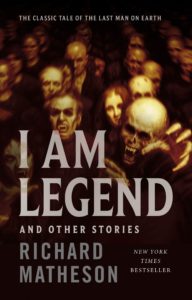
I Am Legend is a “last man on earth” kind of story about a man named Robert Neville. A mysterious and incurable plague has transformed all other humans into bloodthirsty, nocturnal creatures hellbent on destroying Neville.
By day, Neville stalks and kills the infected monstrosities through the abandoned ruins of civilization. By night, he barricades himself inside his house and waits for the sun to rise again.
As for the vampiric creatures themselves, they view Neville as a “monster” and a threat to their own existence. Hello, irony.
If you’ve seen the 2007 I Am Legend movie starring Will Smith, put that out of your mind. That movie bears little in common with the original book, aside from the basic premise. In fact, the 2007 movie misses the entire point of the “I am legend” novel title.
In some places, this book drags a little. In other places, it’s thrilling and terrifying. It also helped shape and influence the post-apocalyptic “outbreak” genre that’s still going strong today. So it deserves a spot among the best post-apocalyptic science fiction novels of all time.
Fun fact: The 1971 film The Omega Man, starring Charlton Heston and Rosalind Cash, was the first movie based on Richard Matheson’s novel. And when compared to the Will Smith movie of 2007, The Omega Man was more faithful to the original source material. So, if you want see what post-apocalyptic movies looked like in the early 70s, be sure to check it out.
4. Oryx and Crake, by Margaret Atwood
Margaret Atwood is best known for writing The Handmaid’s Tale (especially now that there’s a TV series adaption). But she has also ventured into literary post-apocalyptic fiction with her Oryx and Crake novel.
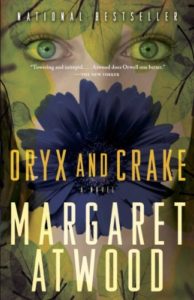
Here’s the story in a nutshell:
Snowman, known as Jimmy before mankind was overwhelmed by a plague, struggles to survive in a world where he may be the last human. Snowman mourns the loss of his best friend, Crake, and the beautiful and elusive Oryx whom they both loved.
Snowman sets out in search of answers, with the help of the green-eyed “Children of Crake,” and thus the story unfolds.
From what I’ve read, Atwood considers this book to be speculative fiction and “adventure romance,” and dislikes the sci-fi label. Alas, when you add a bioengineered race of human-like beings to your story, people will apply science fiction and fantasy labels. But I digress.
I put this novel onto my list of best post-apocalyptic sci-fi books because (A) it takes place after a bioengineered apocalypse, and (B) it features a race of people created by a human scientist.
And along with The Passage and The Road, it’s also one of the most well-written novels on this list.
5. The Passage, by Justin Cronin
The Passage is a post-apocalyptic sci-fi novel unlike anything I’ve ever read before. It delivers excellent world-building, with new “civilizations” rising from the old world, along with some truly frightening moments and memorable characters.
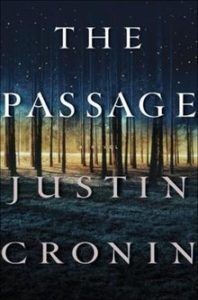
In some ways, The Passage reads like an epic fantasy novel. We have tribal communities, characters on a journey, and hints of magic. But I’ve ranked it among the best post-apocalyptic science fiction books because it checks both of those boxes as well.
The apocalyptic part is somewhat obvious. The first novel in this three-book series is both pre- and post-apocalypse, because it starts before the collapse of civilization. (No spoilers there; you can glean that much from the book jacket.)
The science fiction component comes from the nature of the antagonists in this novel. Again, I won’t spoil anything. Suffice to say there’s a scientific lead-up to the main events in the story. In fact, this post-apocalyptic science fiction novel starts off with an email exchange between two scientists.
6. Planet of the Apes, by Pierre Boulle
“Take your stinking paws off me, you damn dirty ape!”
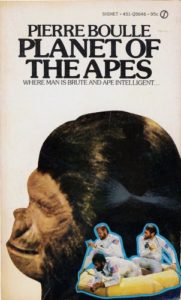
A line from the movie, not the book. But hilarious all the same.
French novelist Pierre Boulle wrote The Planet of the Apes in 1963. And the rest, as they say, is history. Boulle’s story went on to inspire a series of films in the 1960s and 70s, a TV series, and a trio of Hollywood reboots spanning from 2001 to 2017.
The sci-fi component of this story is obvious. It involves space travel, distant planets, and talking apes. But I can’t say what makes this novel post-apocalyptic science fiction without spoiling some key plot points.
So let’s stick with a basic summary:
The Planet of the Apes tells the story of three astronauts who land on a planet that, at first, seems very similar to Earth. It has a temperate climate, lush forests, and breathable air. Hooray!
But the trio soon discover a terrifying truth. Intelligent and “civilized” apes rule this planet, while animalistic humans are kept in cages. The protagonist struggles to unlock the secret of a terrifying civilization, all the while wondering if he’s going to save the human race, or witness its end.
7. The Road, by Cormac McCarthy
Like many of Cormac McCarthy’s novels, The Road is grim, beautiful and sparsely written — all at once. It also happens to be his first journey into post-apocalyptic fiction, and he serves it up like a true master. It’s easy to see why he won a Pulitzer Prize for this book.
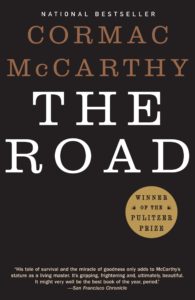
The Road tells the story of a father and son traveling across a scorched landscape, following an apocalyptic firestorm we know very little about. McCarthy shrouds the catastrophic event in mystery, offering scant details about its origin. All we know is that the world has become a wasteland.
From there it becomes a story about humanity — the good, the bad, and the ugly.
And believe me, there’s a lot of ugly in this book. But it also depicts the powerful love between “the man” and “the boy,” a love that keeps them going against all odds. This is one of the best books I’ve read, of any genre.
The question is, does this novel fit into the post-apocalyptic science fiction category I’ve established here? I would argue yes. The apocalyptic part becomes obvious (and harrowing) from the first few pages. The sci-fi part is a bit more subtle and perhaps open to debate. In my view, this book portrays a world destroyed by some kind of cosmic firestorm, and therefore meets the definition of “soft science fiction.”
Whatever you call it, The Road is a unique book written by an inimitable author at the top of his game. So check it out and see what you think. You’ll either thank me or curse me, and I’m okay with either.
8. Robopocalypse, by Daniel H. Wilson
Daniel Wilson’s Robopocalypse is a story about … well, a robot apocalypse. And as someone who has channeled the robot apocalypse concept in my own work, I like where this is headed.
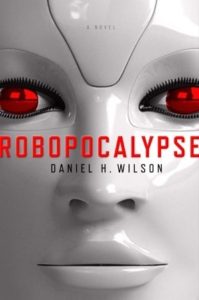
Robopocalypse, which could also be considered a sci-fi thriller, tells the story of an artificial intelligence named Archos that turns against its human creators. Archos is childlike in some ways, but also incredibly powerful. What could possibly go wrong?
Archos uses robots and other machines in an attempt to wipe out humanity, and comes dangerously close to achieving that goal. (No spoilers; that’s all on the book jacket.) The surviving humans put aside their differences and unite against this common foe.
Related article: AI taking over the world
New York Times book critic Janet Maslin described Robopocalypse, as a “Steven Spielberg movie in the larval stage, an ingenious, instantly visual story of war between humans and robots.”
Fun fact: Author Daniel Wilson earned a PhD in Robotics from Carnegie Mellon University, along with a Masters degrees in Machine Learning and Robotics. So if anyone’s qualified to write a post-apocalyptic science fiction novel about a robot uprising…
9. A Song for a New Day, by Sarah Pinsker
A Song for a New Day is a quasi-post-apocalpytic novel set in a near future where deadly viruses and terror attacks have led the government to ban public gatherings. But that doesn’t stop singer Luce Cannon from doing what she loves most — performing before a live audience.
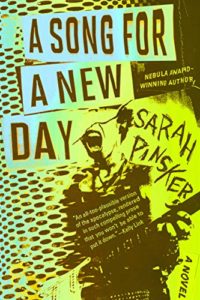
The sci-fi component takes the form of futuristic drone technology and virtual reality experiences, among other things.
I haven’t read this book yet. (Emphasis on yet.) So let me turn it over to Gary Wolfe from Locus magazine:
“Pinsker’s first novel … reads like an intriguing combination of road novel, apocalyptic near-future SF, and – most importantly – character study that explores the compromises faced both by those who see the value in corporatized entertainment (more people get to enjoy it) and those who want to preserve the spontaneity and energy of live performances.”
Turning It Over to You…
Are you a fan of novels that blend the post-apocalyptic and science fiction genres? Is there a book you enjoyed that’s not featured above? I’d love to hear from you, and I’m sure other readers would as well. So feel free to leave a comment in the box below.
Zen Doggie
Earth Abides, 1984, Farenheit 451, The Postman, Oryx and Crake, McCarthy’s The Road, Handmaid’s Tale, Pox. These are all books that have true-to-life possibilities and are more serious than the vampires and walking dead type books.